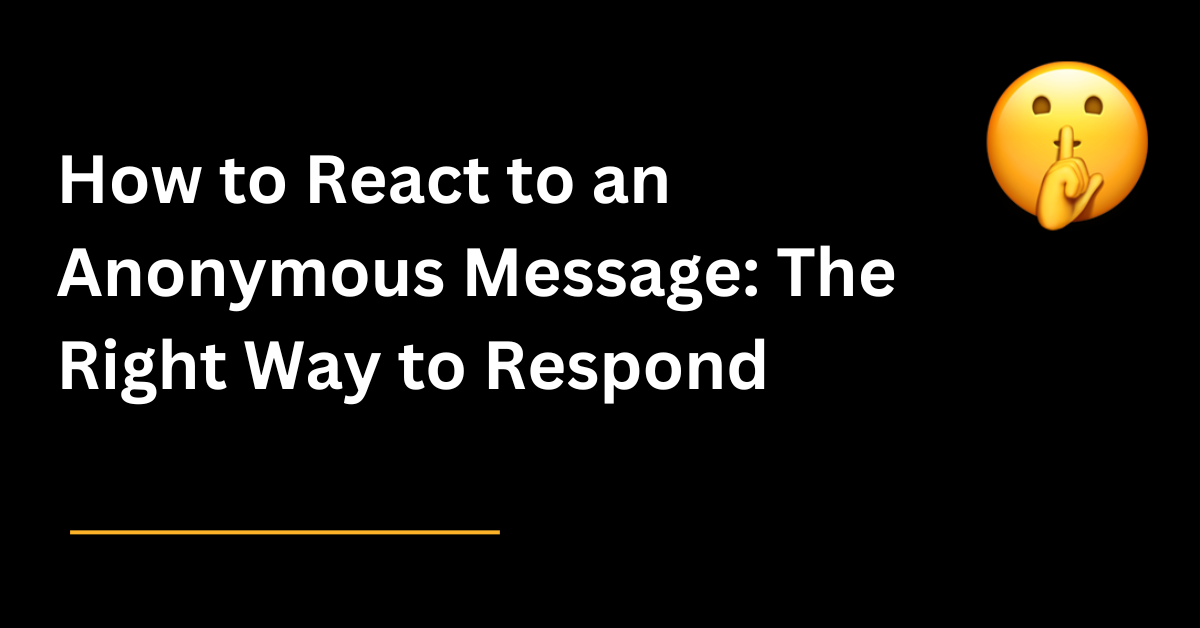Anonymous messages can trigger curiosity, excitement, confusion, or even anxiety. Whether it’s a compliment, constructive feedback, or an outright negative comment, knowing how to handle it properly makes all the difference. This guide will show you the best ways to respond to anonymous messages while maintaining emotional well-being and a positive online presence.
Understanding Anonymous Messages
Before replying, take a moment to analyze the type of message you’ve received:
✅ Positive Messages – Compliments, appreciation, and kind words.
✅ Constructive Feedback – Helpful suggestions or fair criticism meant to improve something.
❌ Negative Messages – Insults, trolling, or hate speech.
❌ Spam or Suspicious Messages – Potential scams, phishing attempts, or misleading information.
How to Respond to Anonymous Messages
1. Stay Calm and Think Before Reacting
It’s natural to feel emotional when receiving an anonymous message. However, responding impulsively—especially to criticism or negativity—can escalate the situation. Take a deep breath and assess the message objectively.
2. Determine the Message’s Purpose
Ask yourself:
- Is this message constructive or meant to harm me?
- Does it offer useful feedback or just negativity?
- Could it be a prank, spam, or a scam attempt?
Once you analyze it, you’ll know whether to reply, ignore, or take further action.
3. How to Respond to Positive Messages
If someone sends an anonymous compliment or encouragement:
- Show appreciation: “Thank you! Your kind words mean a lot.”
- Encourage openness: “I’d love to know who you are so I can thank you personally!”
- Share the positivity: If it’s a social media message, consider sharing it (without exposing the sender) to spread positivity.
4. Handling Constructive Criticism
If the message provides valuable feedback:
- Assess its validity: Does the criticism make sense? Could it help you improve?
- Acknowledge it politely: “Thanks for the feedback! I’ll consider making changes.”
- Ask for clarification if needed: “I appreciate your input! Could you elaborate on what I can improve?”
5. Dealing with Negative or Hurtful Messages
Negative messages can be tough, but you control your reaction:
- Ignore and block: If it’s pure hate, don’t engage.
- Respond with professionalism: If you choose to reply, keep it neutral: “I respect different opinions, but let’s keep this discussion respectful.”
- Report abusive messages: If someone is harassing you, report it to the platform.
🚨 Example: If someone anonymously messages, “You’re terrible at this,” instead of reacting emotionally, reply with: “I appreciate different perspectives. Let’s keep things constructive.”
6. Identifying Spam or Suspicious Messages
Some anonymous messages may be scams or phishing attempts:
- Don’t click on links: Avoid unknown attachments or suspicious links.
- Report and delete: If the message looks sketchy, flag it and move on.
- Educate yourself: Stay aware of common online scams and fake messages.
Responding Publicly on Social Media & Instagram Stories
Want to acknowledge anonymous messages publicly? Here’s how:
For Positive Messages:
- Share a screenshot with a thank-you message in your Instagram story.
- Post a response appreciating the message while keeping the sender anonymous.
For Constructive Feedback:
- Address it openly if it contributes to meaningful conversation.
- Share your thoughts and how you plan to improve.
For Negative or Hurtful Messages:
- Post a general statement about respectful communication instead of calling out the sender.
- Avoid fueling negativity—respond with kindness or silence.
For Spam or Harassment:
- Use social media tools to report inappropriate content.
- Educate your audience on handling anonymous negativity.
Should You Respond or Ignore?
🔹 Respond when: The message is positive, constructive, or deserves clarification.
🔹 Ignore when: It’s hateful, spammy, or meant to provoke a reaction.
Protecting Your Emotional Well-being
Receiving anonymous messages can be overwhelming. Here’s how to take care of yourself:
- Set boundaries: You don’t have to respond to everything.
- Talk to someone: If a message affects you, share it with a friend or mentor.
- Use moderation tools: Many platforms allow filtering or limiting anonymous messages.
FAQ: Common Questions About Anonymous Messages
1. How do I stop receiving anonymous messages?
Most platforms allow you to disable anonymous messaging in settings. If needed, use filters to block unwanted messages.
2. What should I do if an anonymous message threatens me?
If a message includes threats or harassment, report it to the platform immediately and, if necessary, to local authorities.
3. Can anonymous messages be traced?
It depends on the platform. Some services allow complete anonymity, while others may track abusive behavior for security reasons.
4. Should I reply to hate messages to defend myself?
It’s best not to engage. Ignoring or blocking negativity is often more effective than trying to argue or defend yourself.
Conclusion
How you react to anonymous messages shapes your online experience. Whether you express gratitude, acknowledge feedback, or ignore negativity, staying calm and in control is key. Set boundaries, protect your well-being, and engage wisely.
📢 What’s the most unexpected anonymous message you’ve ever received? Share your thoughts in the comments below!

